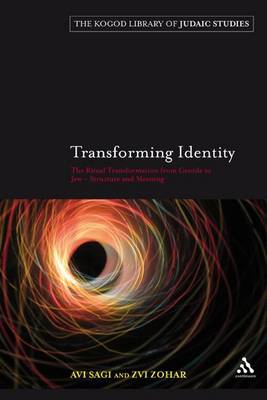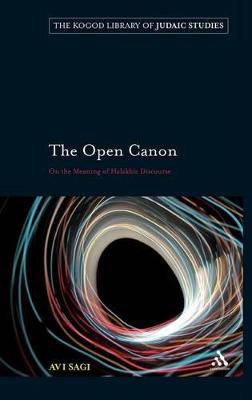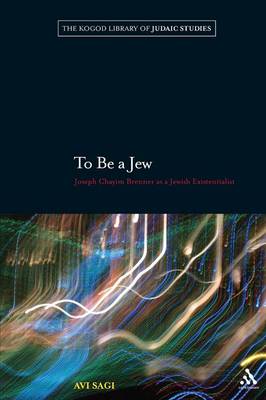The Robert and Arlene Kogod Library of Judaic Studies
3 primary works
Book 3
Of all Judaic rituals, that of giyyur is arguably the most radical: it turns a Gentile into a Jew - once and for all and irrevocably. The very possibility of such a transformation is anomalous, according to Jewish tradition, which regards Jewishness as an ascriptive status entered through birth to a Jewish mother.
What is the internal logic of the ritual of giyyur, that seems to enable a Gentile to acquire an 'ascribed' identity? It is to this question, and others deriving from it, that the authors address themselves.
Interpretation of a ritual such as giyyur is linked to broad issues of anthropology, religion and culture: the relation of 'nature' and 'culture' in the construction of group boundaries; the tension between ethnicity and religion; the interrelation of individual identity and membership in a collective. Fully aware of these issues, this groundbreaking study focuses upon a close reading of primary halakhic texts from Talmudic times down to the present as key to the explication of meaning within the Judaic tradition.
In our times, the meaning of Jewish identity is a core issue, directly affecting the public debate regarding the relative weight of religion, nationality and kinship in determining basic aspects of Jewish life throughout the world. This book constitutes a seminal contribution to this ongoing discussion: it enables access to a wealth of halakhic sources previously accessible only to rabbinic scholars, fleshes out their meanings and implications within the cultural history of halakha, and in doing so situates halakha at the nexus of contemporary cultural discourse.
What is the internal logic of the ritual of giyyur, that seems to enable a Gentile to acquire an 'ascribed' identity? It is to this question, and others deriving from it, that the authors address themselves.
Interpretation of a ritual such as giyyur is linked to broad issues of anthropology, religion and culture: the relation of 'nature' and 'culture' in the construction of group boundaries; the tension between ethnicity and religion; the interrelation of individual identity and membership in a collective. Fully aware of these issues, this groundbreaking study focuses upon a close reading of primary halakhic texts from Talmudic times down to the present as key to the explication of meaning within the Judaic tradition.
In our times, the meaning of Jewish identity is a core issue, directly affecting the public debate regarding the relative weight of religion, nationality and kinship in determining basic aspects of Jewish life throughout the world. This book constitutes a seminal contribution to this ongoing discussion: it enables access to a wealth of halakhic sources previously accessible only to rabbinic scholars, fleshes out their meanings and implications within the cultural history of halakha, and in doing so situates halakha at the nexus of contemporary cultural discourse.
Book 4
In this groundbreaking study, Avi Sagi outlines a broad spectrum of answers to important questions presented in Jewish literature, covering theological issues bearing on the meaning of the Torah and of revelation, as well as hermeneutical questions regarding understanding of the halakhic text.This is the first volume to attempt to provide a comprehensive map of the available views and theories concerning the theological, hermeneutical, and ontological meaning of dispute as a constitutive element of Halakhah. It offers an attentive reading of the texts and strives to present, clearly and exhaustively, the conscious account of Jewish tradition in general and of halakhic tradition in particular concerning the meaning of halakhic discourse.The Robert and Arlene Kogod Library of Judaic Studies publishes new research which serves to enhance the quality of dialogue between Jewish classical sources and the modern world, to enrich the meanings of Jewish thought and to explore the varieties of Jewish life.
Book 8
This is an exploration of the existentialist Jewishness which is advocated, promoted and displayed in Brenner's writings. "To Be a Jew" deals with the question of the meaning and rationale that the writer Joseph Chayim Brenner attributes to Jewish existence. Many of Brenner's readers assumed that Brenner completely negated Jewish existence and sought to form a new way of life completely disconnected from the traditional Jewish existence. In contrast to this perception, Avi Sagi proves that not only did Brenner not reject the value of the Jewish existence, but the core of his creation was written out of a deep Jewish commitment. Brenner's greatest innovation is found in his new conception of Jewish existence. "To be a Jew", according to Brenner, involves the willingness to discover solidarity with actual Jews, to participate in a society in which Jews can live a free life and to fashion their culture as they wish. Sagi presents the idea that Brenner's is not a Utopian, but a realistic, conception of Jewish existence. Thus this unique conception of Jewish existence is founded on an infrastructure of existential thought.
The Robert and Arlene Kogod Library of Judaic Studies publishes new research which provides new directions for modern Jewish thought and life and which serves to enhance the quality of dialogue between classical sources and the modern world. This book series reflects the mission of the Shalom Hartman Institute, a pluralistic research and leadership institute, at the forefront of Jewish thought and education. It empowers scholars, rabbis, educators and layleaders to develop new and diverse voices within the tradition, laying foundations for the future of Jewish life in Israel and around the world.
The Robert and Arlene Kogod Library of Judaic Studies publishes new research which provides new directions for modern Jewish thought and life and which serves to enhance the quality of dialogue between classical sources and the modern world. This book series reflects the mission of the Shalom Hartman Institute, a pluralistic research and leadership institute, at the forefront of Jewish thought and education. It empowers scholars, rabbis, educators and layleaders to develop new and diverse voices within the tradition, laying foundations for the future of Jewish life in Israel and around the world.


